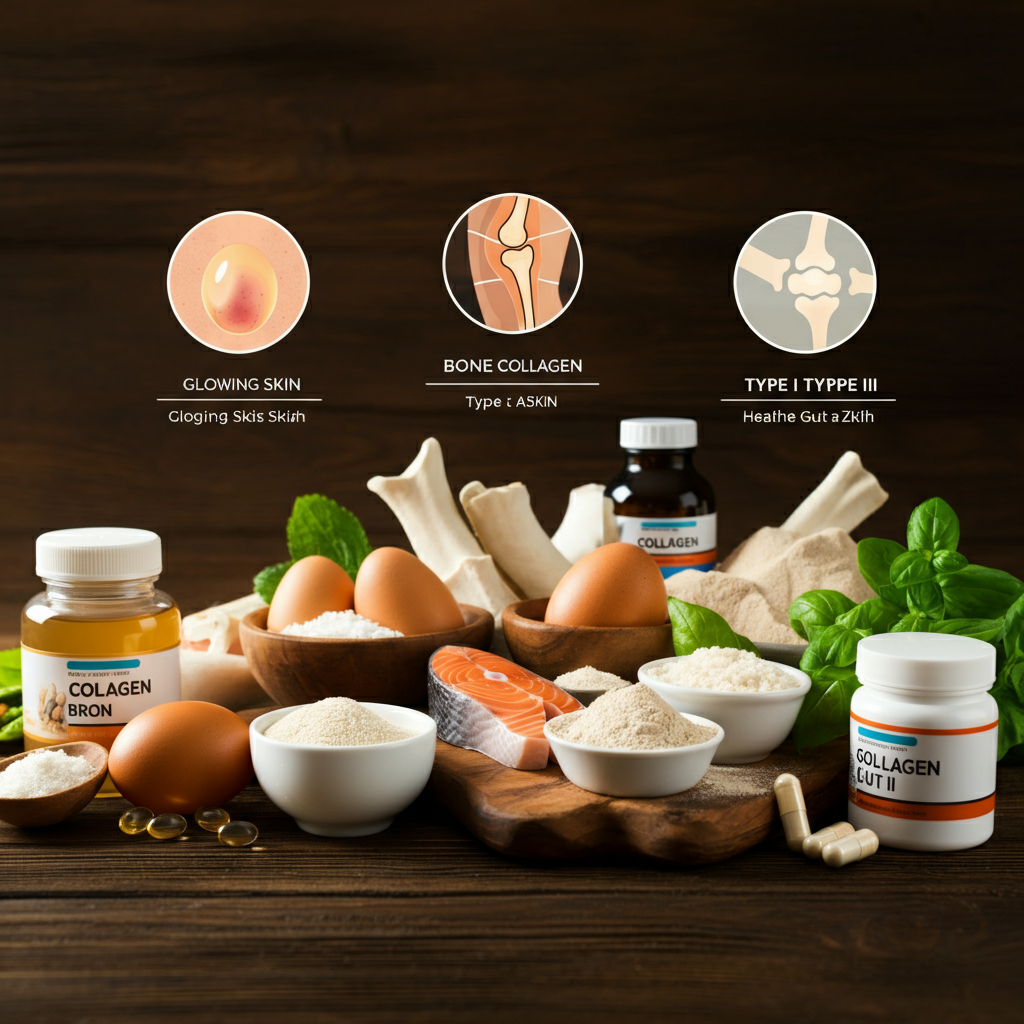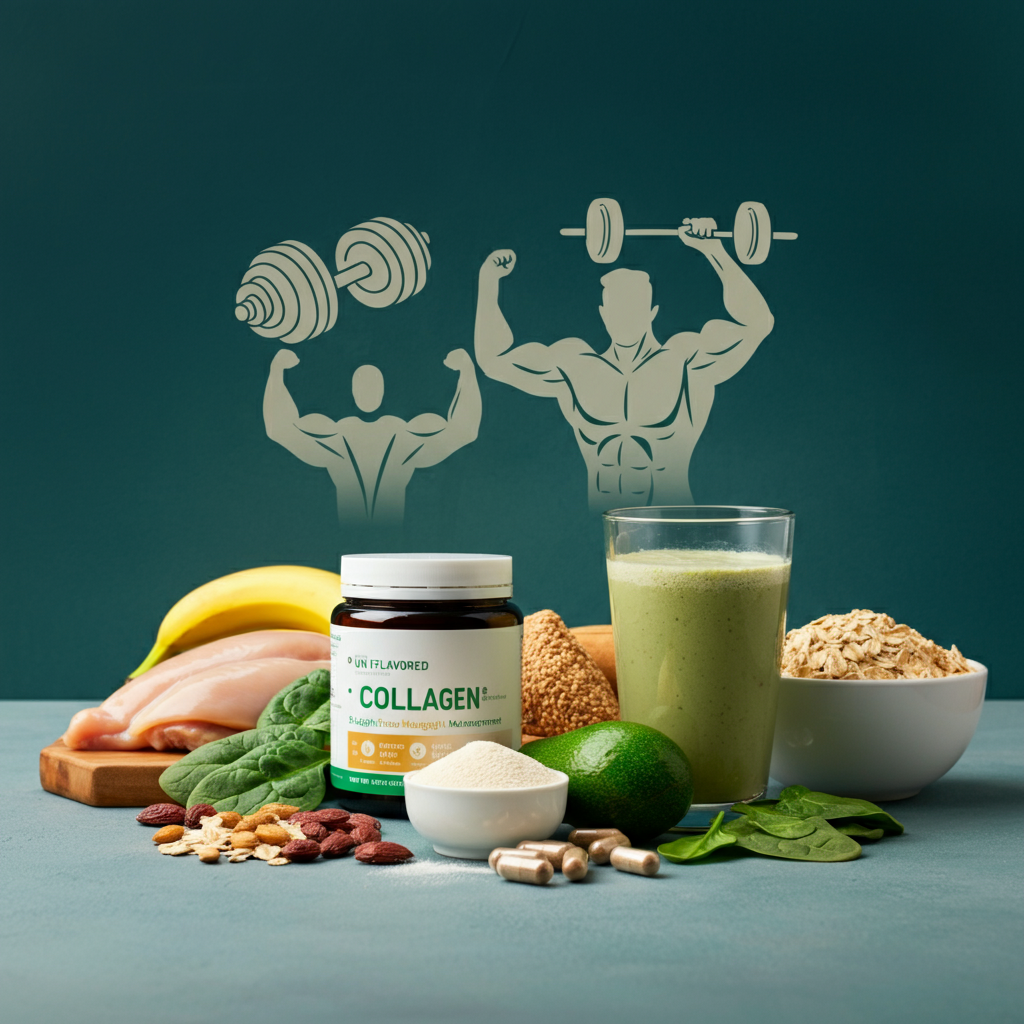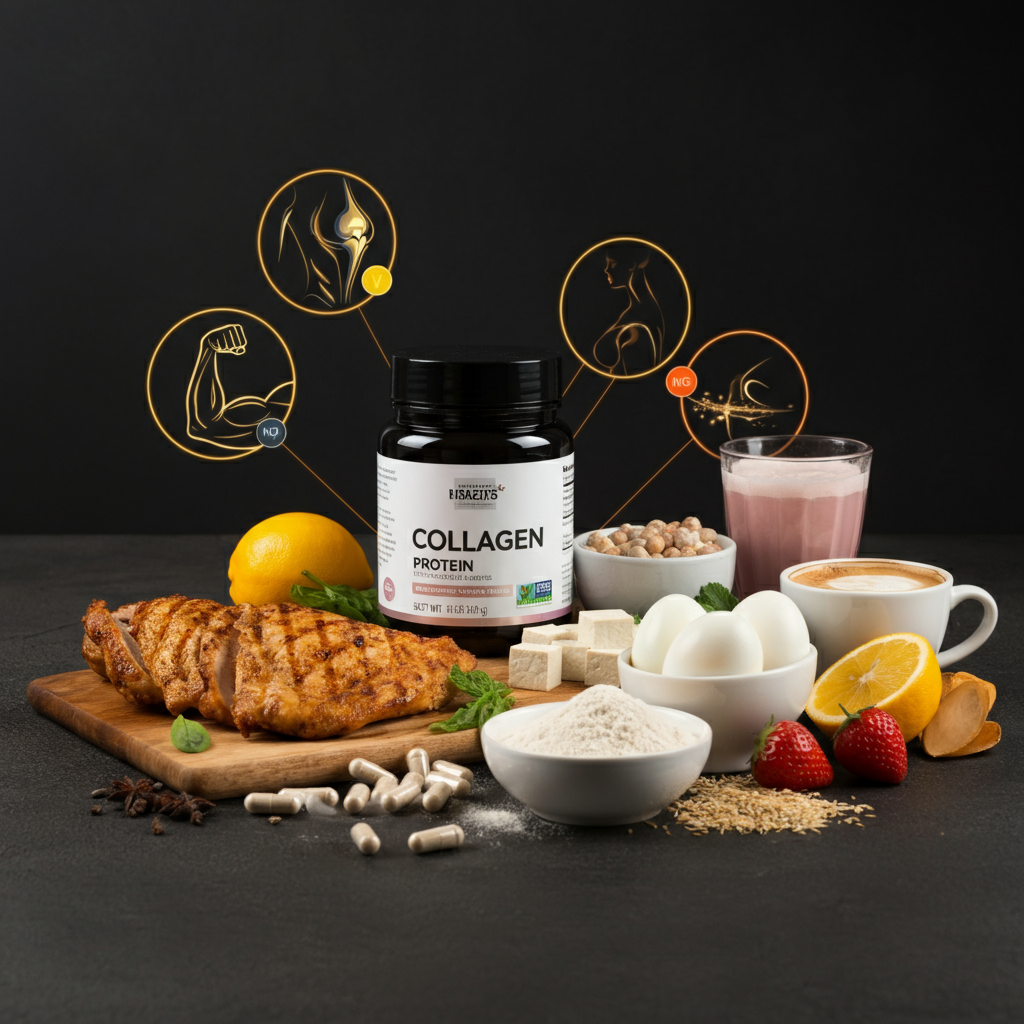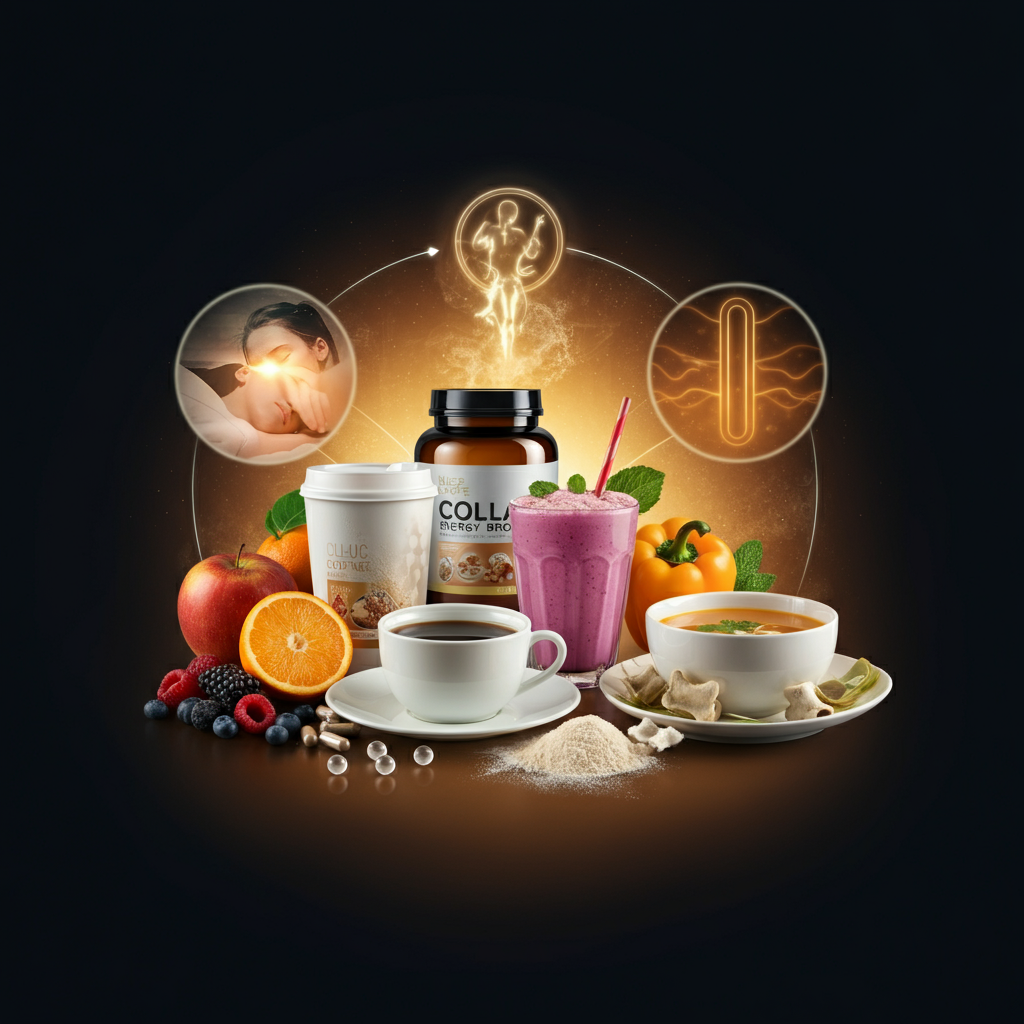Collagen keeps your skin glowing, joints strong, and body healthy—but are you using the right supplement? With so many options, it’s easy to choose wrong.
Stop wasting time and money. This blog breaks down the benefits, risks, and how to pick the best collagen for your needs—fast!
Key Takeaways:
- Benefits of Collagen Supplements: Collagen supplements support skin elasticity, boost joint health, and promote stronger hair and nails. Additionally, they may improve gut health and muscle recovery.
- Potential Risks of Collagen Supplements: While generally safe, some individuals may experience mild side effects such as digestive discomfort. Always consult with a healthcare provider before starting supplementation.
- How to Choose the Best Collagen Supplement: Look for supplements that are hydrolyzed (collagen peptides) for better absorption, sourced from high-quality ingredients, and clearly labeled to suit your dietary needs (e.g., marine, bovine, or vegan options).
What is Collagen?

What is Collagen? Simplified Definition
Collagen is like the glue keeping your body connected. It’s a structural protein that supports your skin’s elasticity, strengthens joints, improves gut health, and plays a critical role in keeping bones strong. Think of collagen as a natural scaffold that holds everything together.
Types of Collagen and Their Benefits
Not all collagen is the same—each type works in unique ways. Here’s a breakdown:
Type I:
- Where it’s Found: Skin, bones, tendons.
- Why it Matters: Essential for glowing, youthful skin, strong bones, and reducing wrinkles.
Type II:
- Where it’s Found: Cartilage.
- Why it Matters: Keeps your joints flexible and reduces pain from wear and tear.
Type III:
- Where it’s Found: Skin, muscles, and blood vessels.
- Why it Matters: Maintains skin elasticity and supports gut health.
Best Sources of Collagen
Natural Food Sources:
- Bone Broth: Rich in Type I and III collagen—great for healthy skin and joints.
- Fish: Contains easily absorbed marine collagen, supporting skin elasticity and hydration.
- Egg Whites: A budget-friendly, natural source of amino acids needed for collagen production.
Supplements Worth Trying:
- Bovine Collagen (from cows): High in Type I and III collagen—great for skin, gut, and bones.
- Marine Collagen (from fish): Absorbs faster into the body, promoting anti-aging benefits.
- Porcine Collagen (from pigs): Affordable and supports tissue repair effectively.
When choosing a supplement, opt for hydrolyzed collagen, also known as collagen peptides. It’s broken down into smaller pieces, making it easier for your body to absorb.
Who Benefits from Collagen?
- Athletes (reduce joint pain, boost recovery with Type II collagen).
- Those with Aging Skin (minimize wrinkles and improve skin hydration using Type I collagen).
- People with Digestive Concerns (heal and seal the gut lining with Type III collagen).
Pro Tip for Supplement Effectiveness
Take collagen with Vitamin C-rich foods, like oranges or strawberries. Vitamin C boosts collagen production naturally.
Benefits of Collagen

Skin Health with Collagen
Collagen plays a crucial role in maintaining radiant, healthy skin. It reduces wrinkles, enhances elasticity, and keeps your skin hydrated. For instance, collagen Type I, found in marine or bovine collagen, supports healing for skin conditions like eczema or acne scars.
- Example: If you are looking to improve skin hydration naturally, try daily collagen supplements in your routine. Combine it with foods rich in Vitamin C like bell peppers or papaya.
- Fact: Collagen can improve skin elasticity by up to 20% in just 12 weeks.
Joint and Bone Support
Collagen helps support joint health by reducing pain and inflammation. It also aids bone density, which is particularly helpful for individuals who are aging or dealing with arthritis. For athletes, collagen (Type II) works well to improve recovery from intense workouts.
- A 2019 study showed 73% of participants experienced reduced joint pain with collagen supplements.
- Add collagen-rich bone broth as part of your meals to naturally obtain nutrients for joint recovery.
Gut Health and Collagen
A strong gut is essential for overall health, and collagen supports the gut lining by healing leaky gut syndrome. Its amino acids, like glycine and glutamine, repair damaged intestinal walls, reducing bloating and improving digestion.
Steps for Incorporation:
- Drink collagen-enriched coffee or smoothies for a powerful gut-healing start to your day.
- Combine collagen with fermented foods like sauerkraut or kimchi for maximum gut benefits.
Fact: Collagen helps improve the gut barrier, which reduces symptoms of irritable bowel syndrome (IBS).
Energy and Protein Contribution
Collagen supports daily protein intake but is not a complete protein (it lacks essential amino acids like tryptophan). However, it complements other sources, helping build muscle and boosting energy levels when paired with a balanced diet.
- Combine collagen with whey or pea protein for a post-workout recovery shake.
- Aids athletes and active individuals in maintaining lean mass and staying energized.
Which of the Following Benefits is Derived from UV Light?

Which of the Following Benefits is Derived from UV Light?
UV (ultraviolet) light plays an important role in human health when used safely and in moderation. Here’s a breakdown of its notable benefits, supported by science:
1. Vitamin D Production
- UVB rays from sunlight trigger Vitamin D synthesis in the skin.
- Vitamin D supports bone health by aiding calcium absorption and preventing osteoporosis.
- It’s also linked to mood regulation, reducing symptoms of depression or Seasonal Affective Disorder (SAD).
Actionable Tip: Aim for 10-15 minutes of sun exposure daily. Protect your skin with sunscreen for longer periods.
2. Enhanced Skin Healing
- UV light can treat certain skin conditions like psoriasis and eczema through controlled phototherapy.
- It also reduces inflammation and may promote the healing of wounds by killing harmful bacteria.
Actionable Tip: Consult a dermatologist before pursuing UV treatments for medical skin conditions.
3. Improved Immune Defense
- Exposure to moderate UV light increases the activity of white blood cells.
- This boosts your body’s ability to fight off infections and pathogens naturally.
4. Mental Health Support
- Sunlight exposure stimulates the release of serotonin, supporting mental balance.
- It combats fatigue and helps regulate sleep-wake cycles by improving melatonin functionality.
Actionable Tip: Incorporate morning walks or outdoor activities to enhance mood and sleep quality.
5. Sterilization and Disinfection
- UV light destroys microorganisms like viruses and bacteria, making it an effective sterilization tool.
- UV-C light, in particular, is widely used in air purifiers and water treatment systems.
Caution With UV Exposure
While UV light has benefits, overexposure increases the risk of skin cancer, sunburn, and premature aging. Balance is key—adopting safe sun practices will help you enjoy the positives while minimizing harm.
Can Collagen Powder Cause Constipation?

Does Collagen Powder Cause Constipation?
Collagen powder is widely praised for its benefits to skin, hair, and joint health, but it’s not without concerns. One common issue people report is constipation. Here’s why it happens and how you can prevent it.
Why Collagen Powder Might Cause Constipation
Low Fiber Content
Collagen is a protein supplement, meaning it lacks dietary fiber, which is essential for a healthy digestive system. Without sufficient fiber, digestion slows down, increasing the risk of constipation.
Dehydration
Collagen absorbs water during digestion. If you’re not drinking enough fluids, your gastrointestinal system doesn’t have the resources to function efficiently, potentially leading to harder stools.
Dietary Imbalance
Many collagen users unknowingly fail to pair it with the right foods. A low-fiber diet combined with collagen supplementation can upset digestion.
How to Prevent Constipation While Using Collagen
To keep your digestion healthy while reaping the benefits of collagen, follow these actionable steps:
1. Stay Hydrated
Drink at least 8-10 glasses of water per day. Hydration aids digestion and helps collagen pass through your system smoothly.
Example tip: Set reminders to drink water throughout the day.
2. Add Fiber-Rich Foods
Combine your collagen supplement with fruits, vegetables, whole grains, or chia seeds. These help balance your diet for smoother digestion.
Example idea: Mix collagen with a smoothie that includes spinach, bananas, and flaxseed.
3. Listen to Your Body
Everyone’s digestion reacts differently to supplements. If you notice changes, experiment with adjusting your dosage or adding more fiber and water to your routine.
Pro Tip From A Client
“I had issues with constipation when I started collagen. Adding overnight oats with berries fixed it!” – Julia, client.
Other Potential Solutions
- Consider probiotics to improve gut health. Fermented foods like yogurt, kimchi, or kefir may help support digestion naturally.
- If constipation persists, consult a professional to reassess your diet and supplement usage.
Do Collagen Supplements Cause Cancer?

Do Collagen Supplements Cause Cancer?
Myth-Busting the Cancer Claims
No research conclusively links collagen supplements to causing cancer. Concerns often arise from misinformation or low-quality products containing harmful additives. Collagen itself is a protein your body naturally produces and uses for skin, joints, and overall health.
What You Should Know
- Source Matters – High-quality collagen supplements derived from grass-fed, wild-caught, or organic sources are safer. Low-quality brands risk contamination with heavy metals or chemicals.
- Additives to Avoid – Stay away from collagen products with artificial colors, sweeteners, or unnecessary fillers. Always read ingredient labels.
- Third-Party Testing – Look for products certified by groups like NSF International or USP. This ensures the collagen is free of contaminants.
Practical Examples
- Safe Product Choice: If you’re considering Type I collagen, choose powdered versions without sugar, like Vital Proteins Collagen Peptides. It dissolves easily in coffee or smoothies.
- Healthy Pairing: Use collagen in recipes with vitamin C-rich foods, like oranges or strawberries. Vitamin C helps your body absorb collagen better.
What Does Science Say?
Studies reviewed by health organizations, including the FDA, have not established a direct connection between collagen and cancer risk. However, focus on balanced nutrition and limit exposure to processed food additives to minimize any health risks.
Can Collagen Cause Weight Gain?

Collagen, in its pure form, is a low-calorie protein and isn’t likely to cause weight gain when included in a balanced diet. However, there are factors to consider that influence how collagen impacts your body. Let me break this down clearly and simply:
1. Collagen Alone Won’t Add Pounds
- Collagen contains about 35-40 calories per 10 grams, making it a low-calorie addition.
- It is free of carbs and fats, so it doesn’t trigger fat storage.
- Supplements without sugar or additives are a wise choice to avoid hidden calories.
2. Collagen May Improve Body Composition
Some weight changes might occur due to improved muscle mass, not fat gain:
- Collagen supports muscle repair and growth when combined with strength training.
- For example, taking collagen peptides after workouts alongside vitamin C helps muscle recovery and may slightly increase weight due to lean muscle gain. This is a healthy type of weight.
3. Watch for Sugary Additives
- Pre-flavored or pre-mixed collagen products can sneak in unnecessary sugars or sweeteners.
- Example: A “vanilla” collagen powder with high-fructose corn syrup may increase calorie intake without real health benefits. Always scrutinize the label!
Actionable Tips to Avoid Unhealthy Weight Gains with Collagen
Choose unflavored collagen peptides – they have no added sugars or flavors.
Mix collagen into nutrient-dense recipes:
- Add to smoothies made with spinach, avocado, and a banana.
- Stir into oatmeal or unsweetened almond milk.
Pair collagen with a clean protein source, like eggs or chicken breast, for balanced meals.
For Muscle Health Goals
If gaining lean muscle is your goal:
- Combine collagen with strength training.
- Example regimen: Take 10-15 grams in your post-workout drink with vitamin C-rich fruit.
Does Collagen Count Towards Protein Macros?

Yes, collagen counts towards your daily protein intake because it’s chemically categorized as a protein. However, it’s not a complete protein, meaning it doesn’t contain all nine essential amino acids that your body cannot produce. For example, collagen lacks tryptophan—one of the key amino acids required to build muscle and repair tissues effectively.
Why Doesn’t Collagen Work as a Primary Protein Source?
Collagen primarily consists of three amino acids—glycine, proline, and hydroxyproline. While these are excellent for supporting joint health, skin elasticity, and gut health, they aren’t sufficient for comprehensive muscle repair or metabolic functions, which rely on a complete array of essential amino acids. Here’s how collagen can fit into your diet:
Supplement, Don’t Replace: Use collagen to complement, not substitute, whole protein sources like chicken, fish, or tofu.
Combine for Balance: Pair collagen with a complete protein to create a balanced meal. For instance:
- Mix collagen into Greek yogurt and top with chia seeds and blueberries.
- Add it to a post-workout smoothie alongside a scoop of whey protein and a banana.
Focus on Timing: Consuming collagen before workouts may help joints, while after training, mix it with a complete protein source for muscle recovery.
Fun Fact
Did you know that combining collagen with foods rich in vitamin C boosts its absorption? Citrus fruits, bell peppers, and strawberries are excellent additions to collagen-rich recipes.
Practical Example to Meet Protein Macros
Here’s how you can incorporate collagen into your day without shortchanging your dietary protein needs:
- Breakfast: 2 scrambled eggs (12g protein) + collagen coffee (10g collagen protein).
- Lunch: Grilled chicken salad (28g protein) with a drizzle of lemon juice for vitamin C.
- Snack: A smoothie with unsweetened almond milk, 1 scoop of collagen powder (10g), and frozen mango.
Does Collagen Give You Energy?
Collagen itself doesn’t directly give you energy like carbs or fats do, but it plays vital supporting roles in your overall energy levels. Here’s how:
- Improves Sleep Quality
Collagen contains glycine, an amino acid that promotes restful sleep when taken before bed. Better sleep is directly connected to improved energy levels during the day. Studies show that glycine supplements (NCBI article) help reduce fatigue and boost daytime alertness. - Supports Healthy Joints and Muscles
Daily collagen intake reduces joint pain and strengthens connective tissues. Pain-free movement lets you stay active, which naturally enhances energy. Imagine being able to include activities like brisk walks or workouts without discomfort! - Boosts Metabolism
Collagen provides amino acids like proline and glycine, essential for building muscle mass and repairing tissues. Muscle growth supports a faster metabolism, indirectly helping your body produce more energy. Check out more on amino acid metabolism here.
Examples of Collagen’s Role in Energy Support
- Case 1
A client of mine, Mary, struggled to exercise due to joint pain. Adding collagen to her morning smoothie improved her mobility after two weeks. She now reports feeling more energetic throughout the day. - Case 2
Another client, James, had poor sleep patterns. After including collagen supplements in his nighttime routine, his quality of sleep drastically improved. He says, “I’ve never had this much energy in the mornings!”
Ways to Include Collagen in Your Diet
- Morning: Add a scoop of collagen to your coffee or tea.
- Lunch: Include collagen-rich bone broth in your soup or as a drink.
- Snack: Blend collagen powder into a fruit smoothie.
- Evening: Stir collagen into your herbal tea before bed for better sleep.
Pro Tips
- Pair collagen with vitamin C-rich foods like oranges, berries, or peppers. Vitamin C helps your body use collagen more effectively.
- Stay hydrated. Proper hydration further enhances joint and muscle health, boosting your energy levels.
How to Choose the Best Collagen Supplement
Key Factors to Consider When Choosing the Best Collagen Supplement
If you’re serious about supporting your skin, joints, and overall health naturally, selecting the right collagen supplement is crucial. Here’s how you can make an informed choice:
1. Understand the Source of Collagen
Different collagen sources serve unique purposes.
- Bovine Collagen is perfect for improving joint health and supporting skin elasticity.
- Marine Collagen offers higher bioavailability, meaning your body absorbs it more efficiently. It’s great for anti-aging.
- For vegetarians, look for products that contain collagen-boosting ingredients like hyaluronic acid or plant-based alternatives.
2. Certifications Matter
Purity and safety should be non-negotiable.
- Look for supplements with third-party testing certified by organizations like NSF or USP.
- These certifications guarantee that the product contains what’s on the label, free from harmful contaminants.
3. Skip the Additives
Avoid supplements with unnecessary fillers, artificial flavors, or sugars.
- Pure collagen powder or capsules deliver the best results without hidden ingredients.
- Select products that are unflavored or naturally flavored using organic ingredients.
4. Hydrolyzed Collagen for Better Absorption
High-quality collagen is hydrolyzed, breaking it down into smaller peptides for faster digestion.
- Hydrolyzed collagen delivers results efficiently, particularly for skin hydration and joint flexibility.
5. Start with the Right Dosage
Consistency is key to seeing results.
- Begin with a daily dose of 2.5-5 grams.
- Slowly increase to around 10 grams a day based on your health goals.
- For athletes or those with joint pain, opt for 10-15 grams/day.
6. Pair Collagen with Vitamin C
Vitamin C plays a key role in collagen synthesis.
- Incorporate citrus fruits, strawberries, or bell peppers into your daily meals.
- Alternatively, choose collagen supplements fortified with Vitamin C for convenience.
My Go-To Recommendation
For clients looking to enhance skin, hair, and nails, I often suggest marine collagen powder mixed into their morning smoothies. Those working on joint recovery do well with certified bovine collagen stirred into soups or oatmeal.
Product Comparison Table
| Product | Source | Best For | Collagen Type | Key Features | Price Range |
| Vital Proteins Collagen Peptides | Grass-fed bovine | Skin, hair, nails, joints | Type I, III | Includes Vitamin C and hyaluronic acid for enhanced absorption; unflavored | $39-$51 |
| Ancient Nutrition Multi Collagen Protein | Multi-source (bovine, chicken, fish, eggshell) | Skin, joints, gut health | Type I, II, III, V, X | Includes probiotics and Vitamin C; gluten-free, dairy-free | $59 |
| Bubs Naturals Collagen Peptides | Grass-fed bovine | Skin, hair, nails | Type I, III | NSF Certified for Sport; dissolves easily in hot and cold liquids | $43-$47 |
| Further Food Collagen Peptides | Wild-caught marine | Skin, hair, nails, joints | Type I | Sustainably sourced; highly bioavailable; dissolves without clumping | $30 |
| Promix Grass-fed Collagen Peptides | Grass-fed bovine | Recovery, joint integrity | Hydrolyzed collagen peptides | No added fillers or sweeteners; keto and paleo-friendly | $70 |
| Thorne Collagen Plus | Grass-fed bovine | Skin hydration, anti-aging | Type I, III | Includes Japanese peach extract and nicotinamide riboside for skin repair | $63 |
| HUM Collagen Love | Grass-fed bovine | Fine lines, wrinkles | Type I, III | Includes Vitamin C, hyaluronic acid, and grape-seed extract | $40 |
| Momentous Collagen Peptides | Grass-fed bovine with FORTIGEL | Joint health, active lifestyle | Type I, II, III | NSF Certified for Sport; includes Vitamin C for collagen production | $50 |
Pros and Cons of Collagen Supplements
Collagen Supplements Explained by an Expert
Collagen is one of the most abundant proteins in the body, crucial for skin elasticity, joint cushioning, and gut health. However, collagen production declines with age, making supplementation a popular choice for many.
How to Choose the Right Collagen Supplement
Here are some practical tips for picking the right collagen product for your needs:
Read the Labels Carefully
Check for terms like “grass-fed” or “wild-caught” to ensure quality. For example, Further Food Marine Collagen uses sustainably sourced ingredients, ideal for pescatarians.
Match the Source with Your Goals
If you want better gut health, try Bubs Naturals Collagen, which is grass-fed and keto-friendly. For skin and hair improvements, bovine collagen like that from Vital Proteins works great.
Consider Additives Wisely
Avoid products with artificial fillers. Look for brands that include beneficial extras like Vitamin C or probiotics. For instance, Ancient Nutrition Collagen adds essential nutrients to boost absorption.
How to Use Collagen in Your Daily Routine
Collagen supplements are versatile and easy to use. Here are some simple examples:
- Morning Coffee: Stir a scoop of unflavored collagen into your morning brew. It dissolves fast and adds no taste.
- Smoothies: Blend marine collagen with fruits and greens for a nutrient-packed drink.
- Post-Workout Shakes: Add it to protein shakes for joint recovery and muscle support.
Best Practices for Collagen Supplementation
To maximize benefits, integrate collagen into a balanced diet:
- Combine collagen with a diet rich in fruits, vegetables, and lean proteins.
- Drink plenty of water to improve skin hydration and elasticity.
- Take collagen supplements consistently to see results in 4–8 weeks.
Potential Downsides and Precautions
While collagen has many benefits, some individuals may experience side effects. Be mindful of the following:
- Allergic Reactions: Shellfish allergies may make marine collagen unsafe for some users. Read the ingredient list carefully before purchasing.
- Digestive Upset: Start with a smaller dose to ensure your gastric system handles it properly.
- Cost: High-quality collagen supplements range between $30–$60 monthly, which may feel expensive over time.
Is Collagen Right for You?
Before you invest in collagen, ask yourself what your goals are. If you’re looking to improve your skin texture, support joint health, or enhance gut function, collagen is an excellent addition to your routine. Always choose reputable brands to ensure safety and efficacy.
FAQs
What are the main health benefits of taking collagen supplements?
Collagen supplements are widely praised for promoting skin elasticity, reducing wrinkles, improving joint health, and supporting stronger nails and hair. Additionally, they may aid in maintaining a healthy gut lining and improving muscle recovery after exercise.
Are there any risks or side effects associated with collagen supplements?
While collagen is generally considered safe for most people, some individuals may experience minor side effects such as digestive discomfort, allergic reactions to certain animal-based collagen, or an unpleasant aftertaste. It’s always advisable to consult with a healthcare provider before starting any new supplement.
How long does it take to see results from collagen supplementation?
Results depend on the individual and the desired outcome. On average, noticeable improvements in skin elasticity and hydration may appear after 4–8 weeks, while benefits for joint health and muscle recovery might take 8–12 weeks of consistent use.
What are the differences between collagen types (Type I, II, III, etc.), and which one should I choose?
Type I collagen is best for skin, hair, and nails, Type II supports cartilage and joint health, and Type III is often used for gut and skin health. Many supplements contain a blend to offer multiple benefits, so choose based on your specific needs.
What is the best time of day to take collagen supplements?
There’s no definitive rule, but many people prefer taking collagen in the morning, mixed with coffee or smoothies, to kickstart their routine. Others opt for nighttime consumption, believing it may support the body’s natural repair processes during sleep. What matters most is consistency in daily intake.


Leave a Comment